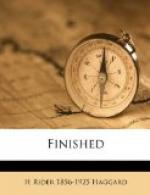At last my wagons were laden with ammunition and other Government goods and I trekked over awful roads to Helpmakaar, a place on the Highlands not far from Rorke’s Drift where No. 3 Column was stationed. Here we were delayed awhile, I and my wagons having moved to a ford of the Buffalo, together with many others. It was during this time that I ventured to make very urgent representations to certain highly placed officers, I will not mention which, as to the necessity of laagering, that is, forming fortified camps, as soon as Zululand was entered, since from my intimate knowledge of its people I was sure that they would attack in force. These warnings of mine were received with the most perfect politeness and offers of gin to drink, which all transport riders were supposed to love, but in effect were treated with the contempt that they were held to deserve. The subject is painful and one on which I will not dwell. Why should I complain when I know that cautions from notable persons such as Sir Melmoth Osborn, and J. J. Uys, a member of one the old Dutch fighting families, met with a like fate.
By the way it was while I was waiting on the banks of the river that I came across an old friend of mine, a Zulu named Magepa, with whom I had fought at the battle of the Tugela. A few days later this man performed an extraordinary feat in saving his grandchild from death by his great swiftness in running, whereof I have preserved a note somewhere or other.
Ultimately on January 11 we received our marching orders and crossed the river by the drift, the general scheme of the campaign being that the various columns were to converge upon Ulundi. The roads, if so they can be called, were in such a fearful state that it took us ten days to cover as many miles. At length we trekked over a stony nek about five hundred yards in width. To the right of us was a stony eminence and to our left, its sheer brown cliffs of rock rising like the walls of some cyclopean fortress, the strange, abrupt mount of Isandhlwana, which reminded me of a huge lion crouching above the hill-encircled plain beyond. At the foot of this isolated mount, whereof the aspect somehow filled me with alarm, we camped on the night of January 21, taking no precautions against attack by way of laagering the wagons. Indeed the last thing that seemed to occur to those in command was that there would be serious fighting; men marched forward to their deaths as though they were going on a shooting-party, or to a picnic. I even saw cricketing bats and wickets occupying some of the scanty space upon the wagons.




